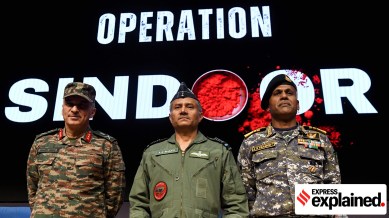Operation Sindoor Dinkar quotes: On Monday, as senior officers of the Indian Armed Forces began briefing the media on Operation Sindoor, a video played on the screen, along with some lines by the poet Ramdhari Singh ‘Dinkar’.
When the officers were later asked about the choice of the lines, Air Marshal A K Bharti responded by quoting a chaupai (quatrain) from the Ramcharitmanas that encapsulated the message that India had sent to Pakistan.
What were these lines from Dinkar (1908-74) and the 16th century Bhakti saint poet Tulsidas, and what message did they convey?
Lines from Dinkar
The lines played at the briefing were: “Jab naash manuj par chhata hai, pehle vivek mar jaata hai (when destruction awaits, good sense is the first to die)”…
“Hit vachan nahin tune maana, maitri ka moolya na pehchana/ Toh le main bhi ab jaata hun, antim sankalp sunata hun/ Yachna nahin ab rann hoga, jeewan jay ya ki maran hoga (You did not listen to good counsel, did not appreciate the value of friendship/ So I am leaving now, here’s my final resolve/ No more imploring, now there will be combat, the triumph of life, or there will be death).”
These are lines from Dinkar’s epic poem Rashmirathi, a retelling of the Mahabharata with Karna as the protagonist, although they are not in the precise order in which they occur in the poem. This passage appears in the chapter ‘Krishna ki Chetavani’ (Krishna’s Warning).
As war between the Kauravas and the Pandavas is imminent, Lord Krishna goes to the Kaurava prince Duryodhana to make one last attempt at peace. He tells Duryodhana that his cousins, the Pandavas, are willing to forgo their right to the kingdom of Hastinapura, if Duryodhana would give them just five villages and leave them in peace.
Story continues below this ad
Duryodhana, blinded by his hatred for the Pandavas, rejects the proposal and tries to arrest Krishna. The Lord then shows him His true, grand, and fearsome form, and tells him that a destructive war is coming for him.
The passage makes the point that the Pandavas tried hard to stay on the path of non-violence and tolerance. To avoid bloodshed and the prospect of kin killing kin, they offered to even give up what was rightfully theirs. But when all their efforts were spurned, they fought the inevitable war with great valour and inflicted defeat on the Kauravas.
The part of ‘Krishna ki Chetavani’ that describes Krishna assuming His majestic form – and showing that life and death, sky and wind, the three worlds, and all vibrations that make up the universe reside within Him – was not played at the DGMO briefing.
Although Rashmirathi is not written in a fixed meter, Dinkar relied heavily on syllabic beats to convey the mood of his narrative. This chapter uses a lot of the 16-matra quatrain structure, even though it does not always stick to it.
Story continues below this ad
The tightly wound cadence of the lines is almost like that of a marching band, to convey veer rasa, or the heroic sentiment. The reflective or mournful passages of Rashmirathi use more drawn-out meters.
Ramcharitmanas reference at Operation Sindoor
When asked about the poem, Air Marshal Bharti replied, “Main bas aapko Ramcharitmanas ki kuchh pankti yaad dilaoonga, aap samajh jaayenge… ‘Binay na maane jaladhi jad, bhay teen din beet/ Bole Ram sakop tab, Bhay bin hoi na preet’. Toh samajhdar ke liye ishaara hi kaafi hai (I would just like to remind you of a few lines from the Ramcharitmanas, and you will understand [the quatrain]… For the wise, a mere indication is enough.”
The chaupai means: “The stubborn ocean would not accede to requests, three days had passed/ Then an angry Rama said, there is no love without fear.”
The Ramcharitmanas is Tulsidas’s version of the Ramayana. These lines come when Lord Rama, on His way to Lanka, asks the ocean to allow Him to pass. For three days, the Lord makes polite requests, even though he had an arrow with which he could have simply dried up the ocean.
Story continues below this ad
But the ocean refuses to comply, and the angry Rama finally takes up his bow and draws the arrow. The ocean then appears, begs him for forgiveness, and allows Rama’s army to pass through.
The line ‘bhay bin hoi na preet’ means that for love or bonhomie to exist, an element of deterrence is necessary, so that the other party is compelled to think twice before giving offence. Friendliness is appreciated only when it is backed by the might to punish.
Interestingly, Dinkar has also written about this incident. His version goes, “Sach poochho, to shar mein hi/ Basti hai deepti vinay ki/ Sandhi-vachan sampoojya usi ka/ Jis mein shakti vijay ki.” This means, “Verily, it is in the arrow that the glow of humility lies, talk of peace is respected only from those who have the power to win.”
The more famous lines from this passage, however, are, “Kshama shobhti us bhujang ko jiske paas garal ho/Usko kya jo dantheen, vishrahit, vineet, saral ho (forgiveness befits the snake which has venom, not one that is defanged, non-venomous, meek and harmless).”
